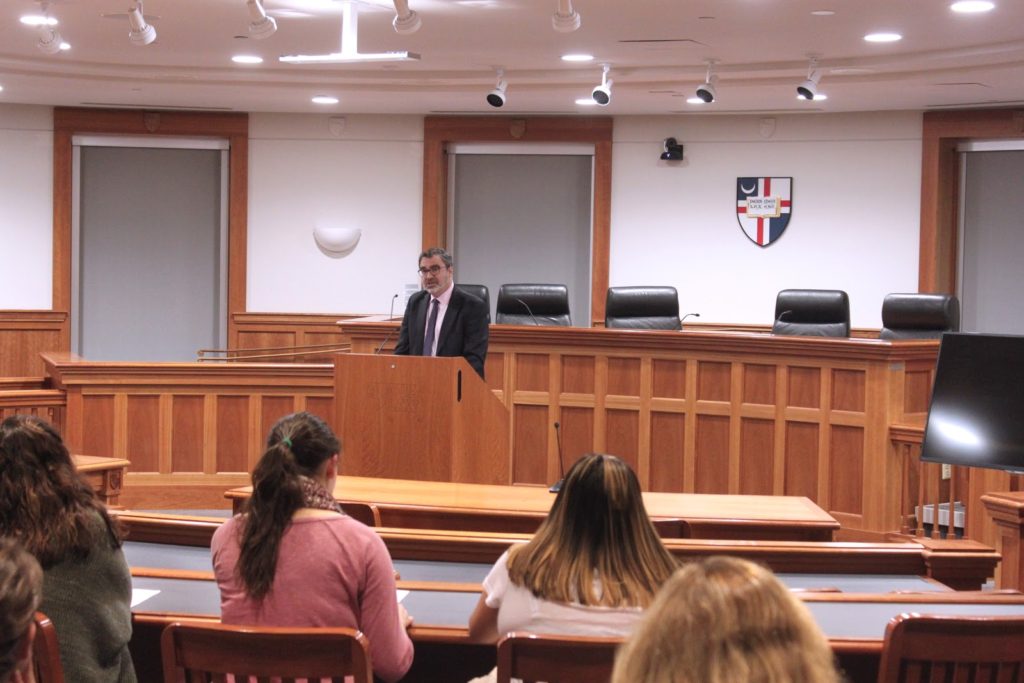Confronting the Refugee Crisis

By Katarina Ivancik
The international refugee crisis was presented as an issue of human dignity which all people, not as Americans, but rather as human beings, must take responsibility for on a personal, national and international level.
The situation was covered by Mark Hetfield, the president and CEO of HIAS, one of America’s nine immigration resettlement agencies,
This speech, followed by a thorough question and answer session, was his contribution to the Brendan F. Brown Lecture Series, which was named to honor the sixth dean of the Columbus School of Law.
“This occasional series seeks to provide the law school community with an opportunity to participate in an exchange of views on a variety of topics within both a formal and informal context”
Hetfield addressed the most pressing issues as well as common misconceptions regarding refugees, asylum, and immigration courts. Refugees are defined by HIAS as, “someone who is unable or unwilling to return to their country of origin due to a well-founded fear of being persecuted for reasons of race, religion, nationality, membership of a particular social group, or political opinion.” Anyone claiming to be a refugee is to be treated as a refugee until proven otherwise according to the first article of the 1951 Refugee Convention.
He followed this statement up with a reminder of his agency’s Jewish roots stating that the Torah says to “welcome the stranger” thirty-six times and HIAS’ motto is “HIAS doesn’t help people because they are Jewish but because we are Jewish.” Essentially meaning that they understand ethnic and religious bias more effectively than most people and are therefore, according to Hetfield, more qualified and even obligated to offer refugees assistance.
The event held in Catholic University’s Columbus School of Law on March 19, 2019, was attended by a mixture of undergraduate and graduate students as well as professors, in total there were less than twenty people in attendance. Dean Regina Jefferson and Professor Stacy Brustin introduced Hetfield and gave some background on HIAS as well as the topic he was covering. They laid out the questions that Hetfield was there to address namely: Do we have a refugee crisis in the U.S. and what are reasonable policies to adopt? Hetfield addressed some aspects of these questions, but the hour-long lecture did not allow enough time to thoroughly cover all the questions introduced by Jefferson and Brustin.
Hetfield recognized that there is a global refugee crisis as well as a particular loss of identity. In light of this recognition he stressed that one of the most pressing issues America faces right now is the loss of our identity as country that welcomes people and provides the opportunity for them to gain full citizenship and equal rights. Rapidly-dropping immigration numbers testify to this issue. In 2016 the U.S. helped resettle 85,000 refugees, 16,000 of which were Syrian refugees and in 2018 the number dropped to less than 25,000 total refugees with only 67 Syrian refugees. Hetfield stated that these shrinking numbers are the result of new immigration policies as well as a constant flood of misleading media sources that feed on the growing fear of terrorism. However, since the convention treaty was established in 1951, not a single refugee resettled by one of the nine immigration resettlement agencies (including HIAS) has ever committed an act of terrorism.
People fleeing from their country to America come to claim asylum, leaving only two options: the Affirmative Asylum Process and Immigration Courts. On the surface, these seem like two viable options, but a cursory glance reveals the underfunded complex processes required by both which leave a current total of one million refugees in detainment centers while waiting to have their request for asylum either processed or judged.
The Immigration Courts especially pose a challenge for refugees since they are treated as criminals until they are granted asylum, making it near impossible to contract reliable lawyers or find witnesses for their cases. Hetfield recalled an instance where he served as a witness for an immigration court case and after asylum was granted a guard remarked on how rare the verdict was. This revealed at least one layer of corruption within the system and strengthened his desire to change the fear-driven narrative and global backlash that refugees face especially in light of recent acts of terrorism. He declared that the U.S. has a responsibility to open our borders to refugees in such a way that it benefits them as well as the nation.
The current levels of security screening required by immigration policies are counterproductive according to Hetfield. They are no longer saving lives, rather they are causing death by preventing people from escaping dangerous positions in countries that persecute or refuse to protect their citizens. Security screening is a necessary process in order to safeguard American citizens, however Hetfield suggests that this process is in need of re-evaluation. Right now it is an expensive and complex process to become a citizen of the United States of America and Hetfield’s talk was a reminder that this country was not founded that way.
Aside from changing the narrative immigration courts and agencies are in desperate need of passionate young lawyers.
“Lawyers have a special duty to protect refugees,” Hetfield said.
His talk was given at Slowinski Courtroom in Catholic’s Columbus School of Law and was particularly targeted towards the handful of young law and pre-law students in attendance who might have an interest in pursuing a career in immigration law. The number of people detained and awaiting asylum are a testament to the necessity of introducing this crisis to not only young law student but young people in general.
He offered advice to college students concerned about the refugee crisis
“To advocate and talk to people, educate and reach out to people,” Hetfield said.
Most people do not fully comprehend the situation and have formed their opinion based on news network reports and social media articles. In order to change the narrative Hetfield urged students, lawyer, and all people to start the conversation.







